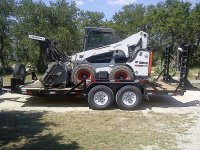yellowdogsvc
Platinum Member
I just bought a new 13k rated 18ft bumper pull trailer for my Bobcat. I pull with an f350 DRW and class 5 hitch. I need to get to the scales because the mulcher and trailer were actually more weight than the dealers told me when I ordered. My truck is rated at 13k and my trailer is rated at 13k to put me right at 26k but I'm not that heavy. I've weighed my truck and other trailer. This one is only 2ft longer and built only slightly heavier so I'm estimating weight a little heavy over what the dealer told me the trailer weighs until I can get to a scale.
The trailer weighs about 2750 lbs with chains. The Bobcat with mulcher weighs about 11,070 lbs but may be a bit less. With a total of 13,850 lbs I am technically overweight on the trailer by itself but that's without transferring any weight to the truck by tongue weight. Am I correct in figuring on subtracting about 10% off the trailer and cargo weight because of the tongue weight? I want to make sure I'm legal. The trailer dealer said I was fine to transfer about 15% of the weight but I want to see what others in the know have to say. I'm not asking about CDL here.. I've already clarified that with Texas Department of Public Safety with a phone call and their flow chart.
Thanks!

The trailer weighs about 2750 lbs with chains. The Bobcat with mulcher weighs about 11,070 lbs but may be a bit less. With a total of 13,850 lbs I am technically overweight on the trailer by itself but that's without transferring any weight to the truck by tongue weight. Am I correct in figuring on subtracting about 10% off the trailer and cargo weight because of the tongue weight? I want to make sure I'm legal. The trailer dealer said I was fine to transfer about 15% of the weight but I want to see what others in the know have to say. I'm not asking about CDL here.. I've already clarified that with Texas Department of Public Safety with a phone call and their flow chart.
Thanks!


